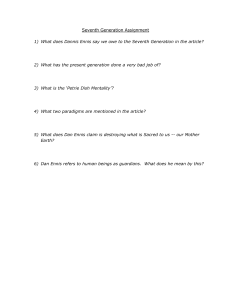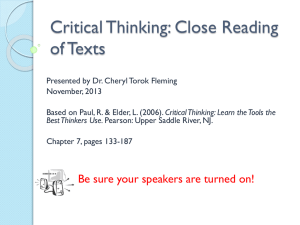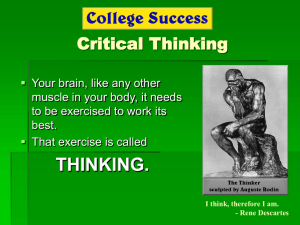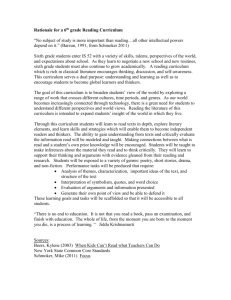Fundamentals of Critical Thinking Narrowing The Gulf Conference March 26, 2009
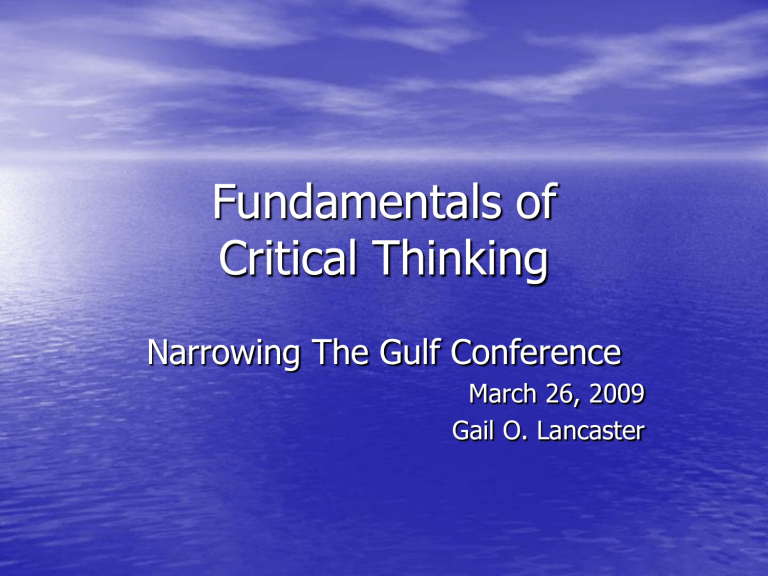
Fundamentals of
Critical Thinking
Narrowing The Gulf Conference
March 26, 2009
Gail O. Lancaster
Game plan
• Consider elements, standards and intellectual traits per Paul and Elder
• Examine critical thinkers throughout history
• Identify Paul and Elder’s fundamentals in other’s thinking or theories of thinking
Paul and Elder
• Elements
• Standards
• Intellectual Traits
Paul and
Elder
Critical Thinkers From History
• King Solomon – 950 BC
• Socrates – 400 BC
• Hugo of St. Victor (12 th Century)
• Sir Francis Bacon (16 th Century)
King Solomon
• Wisdom
• Discernment
• Effective Ruler
Socrates
• Questioning
• Probing
• Search for meaning
• Search for truth
Hugo of St. Victor
• Didascalion – pedagogical guide of the 12 th
Century
• Meditatio (reflection, contemplation, practice, and rehearsal)
• Independent reflection with humility and patience
• Personal engagement with problems leading to new thoughts and deeper insight
Francis Bacon
• Father of the Scientific Method
• “We must become as little children in order to enter the kingdom of science”
Critical Thinkers and Theorists in
Modern Times
• Dewey – 1930’s
• Ennis – 1980’s
Dewey
Reflective Thinking
• Dispositions of thinking
– Open mindedness
– Whole heartedness
– Intellectual
Responsibility
• Native Resources
– Curiosity
– Suggestion
– Orderliness
Ennis
• Critical thinking is “reasonable, reflective thinking focused on deciding what to believe or do.”
Ennis -
Actions a learner usually must take in order to think critically
• Judge the credibility of sources
• Identify conclusions, reasons and assumptions
• Judge the quality of an argument including the acceptability of its reasons, assumptions, and evidence
• Develop and defend a position on an issue
Ennis -
Actions a learner usually must take in order to think critically
• Ask appropriate clarifying questions
• Plan experiments and judge experimental designs
• Define terms in a way appropriate for the context
• Be open-minded
• Try to be well-informed
• Draw conclusions when warranted, but with caution
The essential question…
• What do we need to do as educators to encourage critical thinking?
– Ask open-ended questions
– Don’t use PowerPoint
– Find relevance – how they can relate
– Get a different perspective – outside the box
– Using positive reinforcement when seeing students thinking critically
– Probe responses – take a more facilitative role
– Educators must first be critical thinkers
• Humility, courage – questioning is a good thing
• Know where your students are coming from and where they want to go (goals)
• Be willing to make mistakes – open mindedness
– Stay current – read and write – and model critical thinking
– Build confidence in students to ask questions and supply answers
– Encourage students to record their thoughts/findings
References
Dewey, J. (1933). How we think . New York: D. C. Heath.
Ennis, R. (1993). Critical thinking assessment. Theory Into
Practice, 32 (3). Retrieved October 25, 2006, from
Academic Search Premier database.
Johnson, S. (1998). Skills, Socrates, and the Sophists:
Learning from history. British Journal of Educational
Studies 46 (2). Retrieved March 23, 2009, from JSTOR database.
Paul, R., & Elder, L. (2006b). The miniature guide to critical thinking concepts and tools (4th ed.). Dillon Beach, CA:
Foundation for Critical Thinking.
Pedersen, O. (1997). The first universities: Stadium
Generale and the origins of university education in
Europe . New York: Cambridge University Press.
